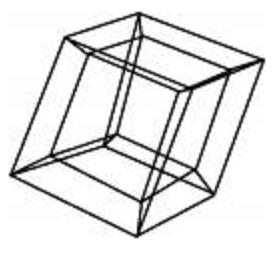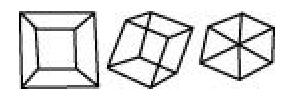This evening over dinner the conversation turned to whether people are capable of visualizing in more than three dimensions, a topic that I have found endlessly fascinating for years. There are some four dimensional shapes that are very easy to think about intellectually, but nonetheless there is a gap between intellectual understanding to intuitive seeing. For example, it is very easy to think about a hypercube. Just as you can place two squares apart in a third dimension and draw four lines to connect them to make a cube, you can place two cubes apart in a fourth dimension and draw eight lines to connect them to make a hypercube. Very easy to describe and to understand, but understanding is not seeing.

When I talk about understanding in four dimensions, I mean something very specific, which I can describe by analogy. If you were a character in Abbott’s novel Flatland, living your whole life within a two dimensional plane, you might develop a great facility for manipulating the ever-changing two dimensional shape formed by the shadow of a wire-frame cube onto your planar world. You could “rotate” these twelve lines that connect eight points into all kinds of shapes: a square within a square, two connected parallelograms, a hexagon surrounding a point, and so on.

But you might play with this shape all day and never see it as a cube the way we think of a cube. For example, you might never be able to envision filling the cube with smaller boxes, stacking those little boxes up, laying them side by side, or other tasks that are quite easy to us three dimensional folks to visualize. But then again you might. It would be pretty easy to design a test to find out. I would argue that you could design a similar test to see whether somebody can really make their way around a four dimensional hypercube.
To me the question of whether people can visualize in four dimensions is intriguing because it’s really part of a larger question: Have our brains evolved through the millenia to deal specifically with three dimensional spaces, or have they evolved to be general purpose problem solvers, which only become attuned to three dimensional space after we are born, in response to the experiences of our senses? The answer to this question could shed light on just how general purpose are these problem solving devices we carry around in our skulls.
There have been studies that illustrate that our intuitive understanding of three dimensional space is a facility that we develop after having directly manipulated objects with our hands as infants. In fact, comparative studies have shown that children who are raised in orphanages where they are not given toys to play with will grow up with diminished capacity for three dimensional reasoning. Apparently, as with spoken language, there is a general window in our development during which we need to be exposed to certain experiences. If we are not exposed to those experiences during those windows, then we end up having diminished skills as adults.
Perhaps it would be possible for an eccentric uncle – or aunt – who happens to be an inventor, to give a toy to a young niece or nephew. You could hold this toy in your hand, manipulate it, turn it around in various ways, and it would behave exactly like a normal four dimensional object. I’m not saying I know how to do this, I’m just thinking out loud here. As we know, technology often ends up providing a way to do things once we know we want to do them. But first we need to think to ask.
I wonder whether that child would end up developing the sorts of physical intuitions about four dimensional space that we have about three dimensions. It would sure be interesting to try, wouldn’t it?
I’d like to think that the 4th dimension is inside ourselves…
the space that exists in the mind plane.
“Apparently, as with spoken language, there is a general window in our development during which we need to be exposed to certain experiences. If we are not exposed to those experiences during those windows, then we end up having diminished skills as adults.”
I always hated this thought. Makes me hate my father and love my mother.